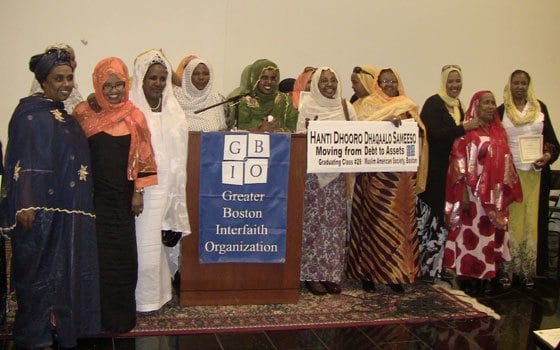
Deeqo Jibril is a native of war-torn Somalia and no stranger to hardship. She spent three years in a refugee camp in Kenya before coming to the United States when she was 12 years old.
Now 32, working full time and raising a family, Jibril speaks of the many mentors she had along the way that helped her build and become accustomed to life here in the United States.
In an effort to return that kindness, Jibril collaborated with the Greater Boston Interfaith Organization (GBIO) to provide fellow Somali immigrant women in the community with an opportunity to better their financial situations.
The program is called Moving from Debt to Assets. It is a financial literacy program run by GBIO, which teaches people about money management by focusing on budgeting, setting goals, cutting spending, saving, learning how to avoid foreclosure and understanding credit.
Jibril worked to bring news of this financial literacy program to her community and it quickly attracted interest from young and old Somali women alike, but there was only room for 25 women to participate in the program this summer. The class met once a week for two-and-a-half hours over the course of six weeks, and was taught in Somali because many of the women didn’t speak English.
Before participating in the Moving from Debt to Assets program, many of these Somali women were in dire financial straits, and struggling to pay for basic essentials.
It would be natural for these women to have some hesitations about taking a financial literacy class in the beginning, but Fadumo Maow, the teacher and an active member in the Somali community said, “everybody in that class was ready to do change in their lives economically and financially.”
In fact, “they were excited,” Maow said. “They were happy to take this class.”
And happy to graduate. Earlier this summer, all 25 women received a certificate of completion and a $500 grant. Graduates were joined by state Sen. Sonia Chang-Diaz, state Rep. Byron Rushing and Boston City Councilors Chuck Turner and Ayanna Pressley to celebrate this occasion. It was the 29th GBIO Moving from Debt to Assets class to graduate.
Siraad Yusuf, a resident of Roxbury, is one of those graduates.
Yusuf left Somalia in 1989 and moved to Holland before coming to the United States in 2002 to build a new life. But when she got here she had many questions. “How can I integrate?” she asked herself. “How can I really build a new life here in Boston?”
She has done well building a life for her family and working at Whittier Street Health Center, but it wasn’t until she took this class that she really learned and understood what it meant to save money, budget and how to use credit cards. Yusuf previously had a credit card, but was afraid and didn’t know how to properly use it.
Moving from Debt to Assets taught Yusuf how to build credit and read credit reports and scores. She also credits the program for giving her tools and basic guidelines to begin the search for her own home.
“My dream was really to have my own house in this country,” Yusuf said. She has filled out paperwork in hopes of qualifying for a Habitat for Humanity home and is now waiting to hear back regarding her status.
Like Yusuf, the other Somali women came to this country without knowledge of how credit cards work and how penalties can accumulate rather quickly. They also didn’t understand how to develop a monthly budget. Many of the women also carried all their money and official documents with them. But after taking the class, they have opened checking and savings accounts and learned that it’s dangerous to carry all their paperwork and forms of identification in their handbags.
According to Joel Schwartz, executive director of GBIO, the single most important thing these women realize upon completion of the course is that they do have a future they need to plan for and there are places they can turn to for help.
The women are not afraid to ask for help now and many of them have continued to seek financial advice and counseling from Jibril and Maow.
Jibril said that she is dedicated to making sure Somali women here in Boston gain independence and are able to advocate for themselves properly. She and Maow have decided to hold monthly support group meetings to address any challenges or barriers the women have faced or still are facing since completing the program.
“My vision is to see them more engaged and help them help themselves,” Jibril said.
Maow said that many of the women she has kept in touch with have created monthly budgets. The women learned the difference between needs and wants. Now when these women are shopping, they think carefully before purchasing an item. If the item is something they want, they leave it there. If it’s something they need, they will buy it.
Not only is Yusuf on her way to owning her own home, but she also said that the budgeting exercise done during the class was a tremendously useful skill to learn. Before taking this class, Yusuf admits she was spending more than what her income brought in. Now, Yusuf said that she does a lot of budgeting and is better able to keep her finances in line.
For the women out there who have not taken the class, Yusuf wanted to remind them that budgeting is very important and if they have credit cards, it is best to pay everything on time.
“I think people need this class when they come [to the United States],” Yusuf said. “I wish I had it when I came to this country.”
Jibril and Maow both noted that there are more Somali women who need help and have expressed an interest in taking the course in hopes of bettering their financial situations and lives.
“My future hope for them is success financially,” Maow said.






